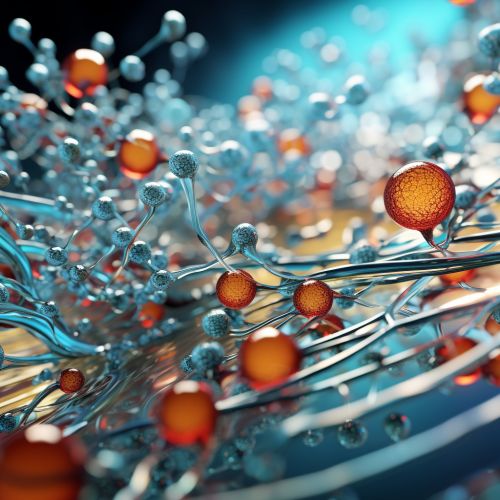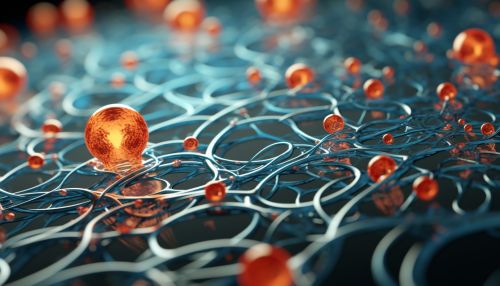Insulin Resistance
Introduction
Insulin resistance is a pathological condition in which cells fail to respond normally to the hormone insulin. This resistance can lead to a variety of health problems, including type 2 diabetes and metabolic syndrome. Understanding the underlying mechanisms of insulin resistance is crucial for the development of effective treatments and prevention strategies.


Physiology of Insulin
Insulin is a hormone produced by the pancreas that plays a key role in the regulation of blood glucose levels. It promotes the uptake of glucose into cells, particularly muscle and fat cells, for storage or for immediate use as energy. In addition, insulin inhibits the production of glucose by the liver, further helping to maintain stable blood glucose levels.
Mechanisms of Insulin Resistance
Insulin resistance occurs when cells become less responsive to insulin, leading to a decrease in glucose uptake and an increase in blood glucose levels. This resistance can occur due to a variety of factors, including genetic predisposition, obesity, physical inactivity, poor diet, and certain medical conditions.
Genetic Factors
Certain genetic factors can increase the risk of developing insulin resistance. These include variations in genes that regulate insulin action, glucose metabolism, and fat storage. However, the relationship between these genetic factors and insulin resistance is complex and not fully understood.
Obesity and Physical Inactivity
Obesity, particularly abdominal obesity, is strongly associated with insulin resistance. Excess fat, especially in the abdominal area, can interfere with insulin's ability to regulate glucose levels. Physical inactivity can also contribute to insulin resistance by leading to weight gain and decreased muscle mass, which can affect insulin sensitivity.
Dietary Factors
A diet high in saturated fats, trans fats, and refined carbohydrates can contribute to insulin resistance. These types of foods can lead to weight gain and can also directly interfere with insulin action.
Medical Conditions
Certain medical conditions, such as polycystic ovary syndrome (PCOS) and hypertension, can increase the risk of insulin resistance. In addition, conditions that cause chronic inflammation, such as autoimmune diseases, can also contribute to insulin resistance.
Consequences of Insulin Resistance
Insulin resistance can lead to a variety of health problems. The most well-known consequence is type 2 diabetes, which occurs when the pancreas can no longer produce enough insulin to overcome the resistance. However, insulin resistance can also lead to other health problems, including metabolic syndrome, heart disease, and certain types of cancer.
Type 2 Diabetes
Type 2 diabetes is a chronic condition characterized by high blood glucose levels. It is the most common consequence of insulin resistance. Over time, high blood glucose levels can lead to a variety of complications, including heart disease, kidney disease, nerve damage, and vision problems.
Metabolic Syndrome
Metabolic syndrome is a cluster of conditions that occur together, increasing the risk of heart disease, stroke, and type 2 diabetes. These conditions include increased blood pressure, high blood sugar, excess body fat around the waist, and abnormal cholesterol or triglyceride levels.
Heart Disease
Insulin resistance can lead to heart disease by causing a variety of changes in the cardiovascular system. These changes include increased blood pressure, increased levels of triglycerides, decreased levels of high-density lipoprotein (HDL) cholesterol, and increased levels of low-density lipoprotein (LDL) cholesterol.
Cancer
There is growing evidence that insulin resistance may increase the risk of certain types of cancer, including breast, colon, and pancreatic cancer. The exact mechanisms by which insulin resistance may contribute to cancer development are not fully understood, but may involve changes in cell growth and division, inflammation, and hormone levels.
Prevention and Treatment
Prevention and treatment of insulin resistance primarily involve lifestyle changes, including a healthy diet, regular physical activity, and weight loss. In some cases, medication may also be used.
Diet
A diet rich in whole grains, fruits, vegetables, lean proteins, and healthy fats can help prevent and manage insulin resistance. This type of diet can help maintain a healthy weight, improve insulin sensitivity, and regulate blood glucose levels.
Physical Activity
Regular physical activity can help prevent and manage insulin resistance by helping to maintain a healthy weight and improve insulin sensitivity. Both aerobic exercise, such as walking or cycling, and resistance exercise, such as weight lifting, can be beneficial.
Weight Loss
Weight loss can significantly improve insulin sensitivity and reduce the risk of developing type 2 diabetes and other health problems associated with insulin resistance. Even a modest weight loss of 5-10% of body weight can have significant health benefits.
Medication
In some cases, medication may be used to treat insulin resistance. These medications work in various ways to improve insulin sensitivity, regulate blood glucose levels, or reduce the production of glucose by the liver.
